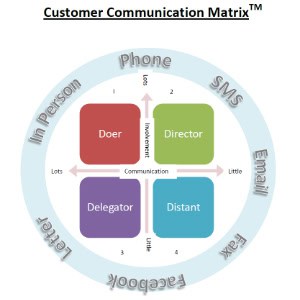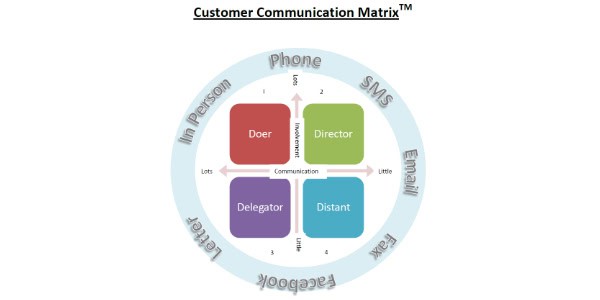4D’s to Exceptional Customer Care (WT788)
BlogAbout twelve years ago I created a model to help a property management company better understand and look after their customers.
Their property managers were struggling with the different demands and expectations of their customers, in relation to how much involvement they wanted in the process and how much communication they wanted. They also struggled to understand their customers’ preferred methods of communication.
Taking inspiration from Stephen Covey’s Time Management Matrix, I created The Customer Communication MatrixTM.
Over the years I’ve found the model applies to most industries.
Here’s how it works, using a real estate example. You can substitute your industry.
Ask your customer the following questions and plot their ideal communication/involvement position on the matrix. Circle their top 3 preferred mediums for communication.
1. On a scale of 1-10 (1 low, 10 high), how much involvement would you like during the process of selling your home/managing your investment property?
2. On a scale of 1-10 (1 low, 10 high), how often would you like us to communicate with you during the process of selling your home or managing your investment property?
3. How would you like us to communicate with you? Choose your top 3 preferred methods.
4. What sort of information would you like us to communicate to you?
The answers to questions 1 and 2 will help you identify which quadrant they fit into.
Check out the diagram and read the summary below. Remember, the example is for real estate.
Doers – like lots of communication and to be highly involved in the process. They are very detailed and want to be involved at every step. Sometimes it can feel as though they want to do your job for you. Definitely detailed – they like to know everything.
Directors – like to give the orders. They want you to do things their way and they want lots of involvement in the beginning. They don’t need a lot of communication. They just want to know you are following their instructions. They can be detailed people. Do it their way.
Delegators – like to delegate the duties and hear from you often. They want to know what’s going on, but don’t want to do it or tell you how to do your job. They are interested in the outcome. They aren’t into detail. Let them know where you are up to without the details or specifics. Talk in terms of progress and outcomes reached.
Distant – They are happy for you to manage the process. They don’t need a lot of communication, in fact, they prefer little communication and little involvement. Just do your job and get the outcome. These customers are big picture people. They don’t want detail, they want results.
The options for their preferred method of communication float around the around circle.
Once you have this information from the customer, all you need to do is to act in accordance with their wishes.
When you do this, you can be confident that you are providing exceptional customer care.
P.S. Invite your friends to get the Weekly Thought delivered directly to their inbox.













